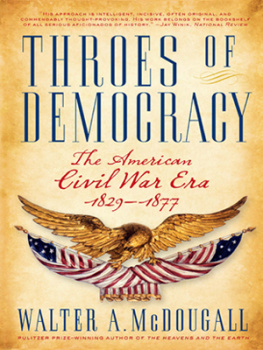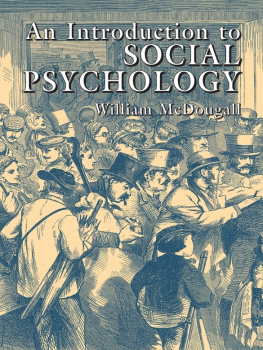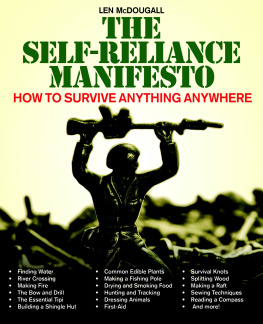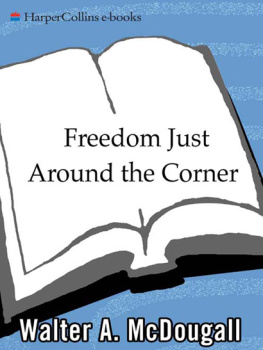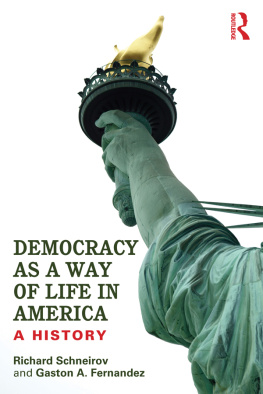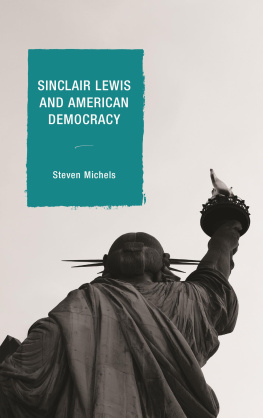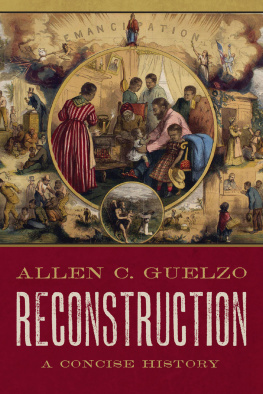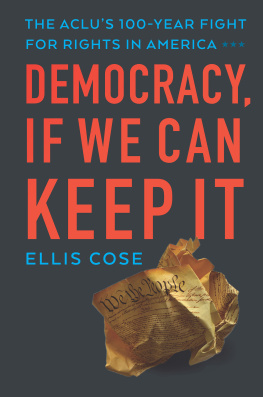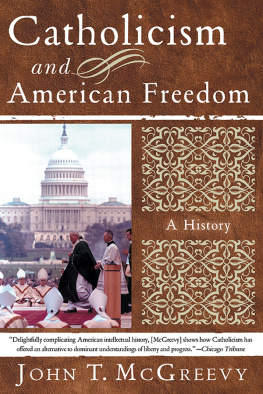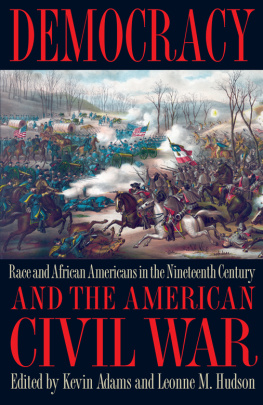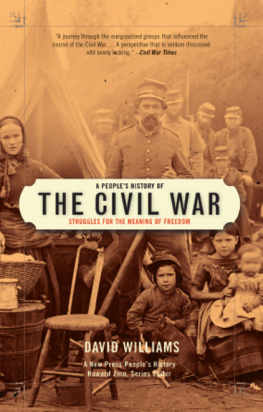Throes of Democracy
The American Civil War Era 18291877
Walter A. McDougall

To all my former teachers and professors
thanks to whom I became a historian
By blue Ontarios shore,
As I mused of these warlike days and of peace returnd, and the dead that return no more,
A Phantom gigantic superb, with stern visage accosted me,
Chant me the poem, it said, that comes from the soul of America, chant me the carol of victory,
And strike up the marches of Libertad, marches more powerful yet,
And sing me before you go the song of the throes of Democracy.
(Democracy, the destind conqueror, yet treacherous lip-smiles everywhere,
And death and infidelity at every step.)
WALT WHITMAN , By Blue Ontarios Shore, Leaves of Grass (18811882 edition)
Contents
A New American History 15851828
Pretenders?
The Melees and Masks of White Mans Democracy Post-1830
Old Hickory, Indians, Bankers, and Whigs
The Politics of Anger Breeds a New Party System, 18291840
Migrants, Farmers, Mechanics, and Clowns
The Anxious, Exciting Birth of an Industrial People, 18301860
Romantic Revelators, Reformers, and Writers
Social Perfectionism and Cultural Pretense, 18301860
Conquistadors
The Glory and Fraud of Manifest Destiny, 18411848
Forty-Niners, Filibusters, Free-Soilers, and Fire-Eaters
Gospels of Slavery, Commerce, and Christ Sunder the Civil Religion, 18491860
Horsemen of the Apocalypse
The Sanguinary Salvation of American Myths, 18611865
Radicals, Klansmen, Barons, and Bosses
Reconstructed, the Great White Republic Flees to the Future, 18651877
Truth-Tellers?
Gimlet Eyes on a Republic of Pretense
MAPS
The maps are from the Encyclopedia of American History (New York: Harper, 1953), ed. Richard B. Morris; and Harpers Atlas of American History (New York: Harper, 1920).
Y ears ago, while stuck in a railroad station cursing a tardy train, I noticed a man in a jacket bedecked with insignia from Vietnam. Experience had taught me that veterans still advertising their service decades after the fact were probably bitter and down-at-the-heels. But to relieve the tedium I mentioned that I, too, was a Vietnam veteran and struck up a conversation. We exchanged the usual questionsWhen were you there? What was your outfit? Where were you based?but then the dialogue flagged. His speech, demeanor, and clothing suggested that he had a blue-collar background and no success in civilian life. We had little in common. But then he surprised me by saying, Im glad I went, cause I learned the lesson of Vietnam. What was that, I inquired. Say no to bullsht, he replied. I feigned a cynical chuckle, then quickly waved good-bye to him because I suddenly found myself choking back tears.
Thank you for sampling this book. If you love history, or just love the United States of America, you may relish this volume. That is not to say you will find all its judgments congenial. Indeed, I hope you do not, because we truly engage the past only when confronted with evidence and arguments that challenge our preconceptions. I found my own challenged repeatedly while researching this book, with the result that I was led into subjects and down paths of argument I never could have anticipated. That is the joy of empiricism. But it harbors a danger as well. The history written by those of us who imagine ourselves the clay and the evidence the sculptor (instead of the other way around) is often misunderstood by fans and critics alike. That is a risk I am willing to run, because the only way a historian can avoid misunderstanding is to distort the past in pursuit of some unmistakable present agenda. Such a procedure leaves no doubt as to where the author is coming from, but it prostitutes history. So where am I coming from? If obliged to put it all in a nutshell I guess I would venture the following. I believe the United States (so far) is the greatest success story in history. I believe Americans (on balance) are experts at self-deception. And I believe the creative corruption born of their pretense goes far to explain their success. The upshot is that American history is chock-full of cruelty and love, hypocrisy and faith, cowardice and courage, plus no small measure of tongue-in-cheek humor. American history is a tale of human nature set free. So how you, the reader, respond to this book will depend in good part on how you yourself (all pretense aside!) regard human nature.
As for me, I have just tried to teach myself American history with two precepts in mind. The first oneWrite as if you are already deadI learned from Nadine Gordimer via the Los Angeles Times s book editor Steve Wasserman. The second precept I learned in a railroad station from an anonymous veteran to whom I feel obligated in ways I cannot explain.
Throes of Democracy: The American Civil War Era 18291877 is the sequel to Freedom Just Around the Corner: A New American History 15851828 (HarperCollins, 2004). That earlier volume traced the colonial and early national history of the American people until the election of Andrew Jackson to the presidency. The present volume carries the story to the end of Reconstruction. You are free to tackle Throes without first having experienced Freedom . Each book is meant to stand alone. But in that case I recommend you peruse the synopsis of the first volume that follows this preface. It will alert you to various themes that inform the present volume as well.
Two admonitions are in order. First, the endnotes are meant to be read, or at least glanced at, because many of them contain substantive, sometimes humorous details I could not bear to leave out. However, to keep the sheer volume of endnotes under control I often insert them after every second or third paragraph rather than every one. So please dont be frustrated when you encounter quotations lacking immediate citations. Just refer to the next endnote and you will find what you seek. Second, you will notice that periodically I interrupt the narrative with sidebars celebrating the entry of new states into the Union. I began this project determined to pay due attention to all regions and states because most general American histories do not. They proceed as if Kansas, for instance, did not exist except when it was bleeding. My solution was to craft thumbnail biographies describing the origins, distinctive characteristics, and local color (again, often humorous) of every new state. The sidebars also illustrate larger themes in the book. But if you are eager to press on with the main narrative, you may skip these sidebars or else return to them at your leisure.
Philadelphia, Pennsylvania
December 2006
A New American History 15851828
T he creation of the United States of America is the central historical event of the past 400 years. If some ghostly ship, some Flying Dutchman , were transported from the year 1600 into the present the crew would be amazed by our technology and the sheer numbers of people on the globe, but the array of civilizations would be recognizable. The crew would find today, as in 1600: a huge Chinese empire run by an authoritarian but beleaguered bureaucracy; a homogeneous, anxious, suspicious Japan; a teeming mosaic of Hindus and Muslims trying to make a great nation of India; an amorphous Russian empire pulsing outward or inward in proportion to Muscovys projection of force; a vast Islamic crescent hostile to infidels but beset by rival centers of power; a dynamic, more or less Christian civilization in Europe aspiring to unity but vexed by its dense congeries of nations and tongues; a sub-Saharan Africa plagued by poverty, disease, and tribal feuds; and a Latin America both blessed with a rich Iberian-Amerindian culture and cursed with strategic impotence. The only continent that would astound the Renaissance time travelers would be North America, which was primitive and nearly vacant as late as 1607, but which today hosts the mightiest, richest, most creative civilization on eartha civilization that perturbs the trajectories of all other civilizations just by existing. Not only was the United States born of revolution; it is one.

